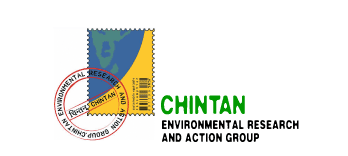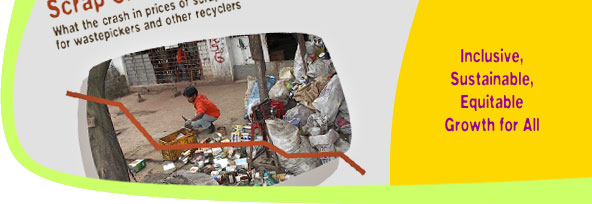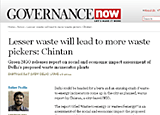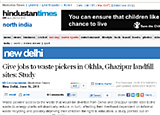|
|
|
FEEL FREE to download and use materials or information
on this website. Just let us know when
and where you are using it!
|
Research & Reports
Light Without the Poison Putting an End to Mercury Escape from CFL Bulbs (2014) The use of Compact Fluorescent Lamps (CFLs) is increasing in India. Although this is a positive development given the energy efficiency of CFLs, these lamps contain trace amounts of mercury which, if disposed off in an environmentally unsound manner, can have an adverse impact on both health and the environment. This report aims to understand better how used CFLs are handled in India; the stages of dismantling and recycling of CFL; the stakeholders involved in CFL disposal; and the awareness level and attitude of the stakeholders towards safe handling of CFLs. The report also proposes to develop a model for the safe disposal and recycling of CFLs in Delhi. This model can be replicated across the country with minor adjustments to account for the price of CFL components in local areas.
The Story of a Dying Car in India Understanding the Economic and Materials Flow of This report aims to present a clear picture of what happens to a vehicle in India at the end of its life-cycle. The study provides a better understanding of the economics of the recycling of ELVs in India, as well as an insight into the attitudes, knowledge, and practices of the ELV handlers. The major focus of the study is the economic, environmental, and social challenges that emanate from a change in status quo. The report also presents a series of recommendations on how to improve the resource efficiency of the ELV industry in India and a system to recognize and formalize the work of a currently largely informal sector, and ways for vehicle manufacturers to take responsibility for the products they release in the market.
Learning to Re-E-Cycle What Working With E-Waste Has Taught Us (2013) This report details the strategies, challenges, and outcomes of the last 6 years of Chintan's work. It is aimed at enabling newer players to learn from Chintan�s experience and contribute to the challenge of enabling the informal recycling sector to enjoy decent, green livelihoods in the e-waste sector.
Give Back Our Waste What the Okhla Waste-to-Energy Plant has Done to Local Wastepickers
Failing The Grade How Cities Across India are Breaking the Rules, Ignoring the Informal Recycling Sector and Unable to Make the Grade
Waste-to-Energy or Waste-of-Energy? Social and Economic Impact Assessment of Waste-to-Energy Projects on Wastepickers near Ghazipur and Okhla Landfills in Delhi A Social Impact Assessment of the impact of two waste-to-energy plants on wastepickers in Delhi. The study shows a definite livelihood loss and likelihood of increased number of child wastepickers. Published 2011.
Scrap Crash! What the crash in prices of scrap means for wastepickers and other recyclers A study of how the economic crisis of 2008-09 impacted Delhi's wastepickers. Published 2009.
Cooling Agents An Analysis of Greenhouse Gas Mitigation by the Informal Recycling Sector in India The study develops a model to measure the greenhouse gas avoidance by informal sector recycling. It applies the model to Delhi to show the sector reduces appx 3.6 times more greenhouse gases than any other project that has registered for carbon credits in the field of solid waste. Published 2009.
Carving Opportunities A Manual to Facilitate Children Wastepickers Access Education A manual that shares the first steps to work with waste picking children, with the objective of helping them access education. Published 2009.
Wasting Our Local Resources The Need for Inclusive Waste Management Policy in India This study examines Indian and International policies and Extended Producer Responsibility in the context of the informal recycling sector and suggests policy shifts as a way forward. Published 2007.
Stealthy Intruders How Persistent Organic Pollutants are harming the health of women. A Guide for Women In India A study of how POPs, or the dangerous class of chemicals, Persistent Organic Pollutants, impact women's health. Published 2006.
The Poison Within How Environment Contamination is Impacting Our Children's Future A manual for anyone who cares about children, detailing how a range of pollutants, from unclean water to toxic chemicals, is impacting the health of Indian children. Based on scientific papers, but easy to read. Published 2006.
Office Matters A Handy Manual for Reducing Every Office's Ecological Footprint A manual to green any office. Published 2005.
Informal Formal Creating opportunities for the informal waste recycling sector in Asia A comparative study solid waste policy and practices in 3 Asian countries-India, the Philippines and Cambodia, with key messages and recommendations emerging from cross-country experiences. Published 2004.
Space for Waste Planning for the Informal Recycling Sector A detailed study that results in norms for micro and macro infrastructure in India for optimal recycling. Published 2003. Eco Gyan (Hindi) A manual on Environment for teachers. Published 2003. Plastics Profiting From Pollution A Primer On Plastics For Everyone This primer attempts to provide an overview of the variety of plastics that we find in our lives. Published 2003. |
SearchChintan Research In The Media"Lesser waste will lead to more waste pickers." Governance Now carries article on Chintan's study Waste-to-Energy or Waste-of-Energy? Hindustan Times published article "Give jobs to waste pickers in Okhla, Ghazipur landfill sites: Study" on Chintan's study Waste-to-Energy or Waste-of-Energy? |



















